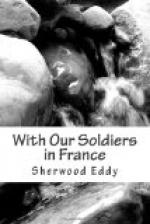Yes, these boys are making the great sacrifice for us. With 5,000,000 who have already been killed, with 10,000,000 of our own sons enrolled. as subject to their call to the colors when needed, with hundreds of American army camps at home and in France already crowded with men, what sacrifice can we make for them? How can we surround their lives with the best influences of home, that they may come back to us even better men than when they went away?
We have seen the terrible ordeal to which they will be subjected at the front, the temptations to which they are exposed in France, in the training schools, and the base camps; we have seen something of the havoc which demoralizing forces have already wrought in other armies in the camps of the prodigals, and we have seen the deadly dangers and perils, both physical and moral, which the soldier must face. We have spoken of the enormous sums voted to carry on a great war of destruction. Is there not a yet more urgent need that we should supply the great constructive forces for fortifying the physical and moral manhood of our nation? Two organizations have been recognized by our own and the other allied governments in the war zone—the one bearing the symbol of the red cross for the wounded, and the other the red triangle for the fighting men.
The nation has already generously responded to the needs of the wounded even before the first battle was fought, giving more in one week than any other nation in a year for the same purpose. And not a dollar too much has been given for this great cause. But we shall soon have several millions of fighting men under arms. What are we to do for these men? We have already seen that they present a threefold need. There is the physical need of these millions who will soon be training, fighting, and suffering. Only the men at the front know what it really is. There are the mental and social requirements of men who must have recreation, healthy amusement and occupation. There is also the moral and spiritual need of men who will face the greatest temptations of their lives, when they will be farthest from the help of home and friends, while old standards seem to be submerged or swept away “for the period of the war.”
We have already seen that the building that bears the red triangle of the Y M C A at the front is at once the soldier’s club, his home, his church where his own denomination holds its services, his school, his place of rest, his recreation center, his bank and postoffice where he writes his letters, his friend in need that stands by him at the last and meets his relatives who are called to his bedside in the hospital. If there is anything which safeguards the physical, social, and moral health of the men who are dying for us, can we do less than provide it for them? While billions are being spent for destruction, must we not at least invest an infinitesimal fraction of one per cent of our expenditure, in construction, in that which is the greatest asset of any nation—its moral manhood? Can we not provide a home away from home for our own sons and the other boys with them whose parents may be too poor to do so?




